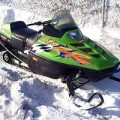Keith: Without a doubt, it's sort of an irony, definitely, within that story. It's not the main irony, but it certainly is one that is within that story. I recall-and I'm not sure who said it-referred back to the perfect world is one where nature rules. The most organized, perfect environment you can be is out in the middle of nature. Civilization cannot perfect anywhere, so essentially we don't live in a perfect world. The world he lives in is probably as close to the perfect world as you can get, and he is a master of that world, so it's definitely an ironic sort of view of things. Now, as that story goes on, he manages to capture some dogs. I was really kind of wondering, because he reflected back on his mementos and how his son would have no need for all of the things that he had, and that he would be giving them to his best friend, Gucho, because in the civilized world there was no need for guns and traps and the like. When he pulled the gun out, I was beginning to wonder what his intentions were? Did you get that feeling while reading that story?
Jill: Yeah, I totally got that same feeling. I was thinking, "Okay, what's he going to do? Is he going to shoot himself, or??" Yeah, I didn't quite know what he was doing, or I didn't know why he was sitting on the snow machine, and yeah, I found it all quite strange. Keith: I definitely got that feeling. When he went and sat on the snowmobile, I was imagining him getting it started and riding it into the shed and shooting the dogs-I was conjuring all sorts of weird ideas. Definitely-when he turns and shoots the snowmobile, what was his purpose there?
Jill: I thought that maybe he was just returning back to his previous way of life, which didn't use any modern conveniences or technology, and that he was happier doing things the old way, and was going to return to that way of life and get rid of anything that was associated with the civilized world. David: Yeah, I agree with that. He was obviously-it was more trouble than it was worth, and that dogs act with a purpose and you can feed them, or they need sleep or something, but machines don't work and there's no rhyme or reason for it. I don't know if the rejection is total-in the story, there seems to be a balance in his life. He talks about-he mentions the freezer or something, "the best invention"- Keith: "The freezer is the best invention. Tea is sunshine in a glass." David: That's right, "sunshine in a glass." And of course, after he shoots the snow machine, he goes in and he has tea, which is probably not a common drink for Inuit people, being generally grown in India. So it's-yeah. There seems to be a sort of practicality in his approach to life. In a way, it could be a tale about moving too quickly in one direction, toward so-called civilization. He uses electricity, and he uses the icebox, and he drinks tea. These things are modern, and they're of civilization, so there's a balance there. It's not a complete rejection of contemporary living? Keith: Could it be a product of consumerism? I'm quite certain when he bought that snow machine in 1968, he was probably told that "this is the greatest invention that there ever was and you won't be able to live without it." Is it a comment on consumerism? Is it saying that, sure, let's keep what's truly great, sunshine in a glass and winter in a box, but let's not buy something or use something simply because somebody tells us? Therein lies the true irony of the story-that we as a society buy into almost anything, but in reality, much of what is the best in this world doesn't come from expensive, costly, troublesome, miserable, no-good pieces of machinery that doesn't work half the time. And like I say, therein lies the irony of that story.
David: He's a clever consumer, he knows what he needs. Obviously, he didn't need that snow machine, and it's not quite as big a slight against the modern world. He's-discriminating, and he's intellectual, and he's discriminating, and he's a simple person, but he's clever.

